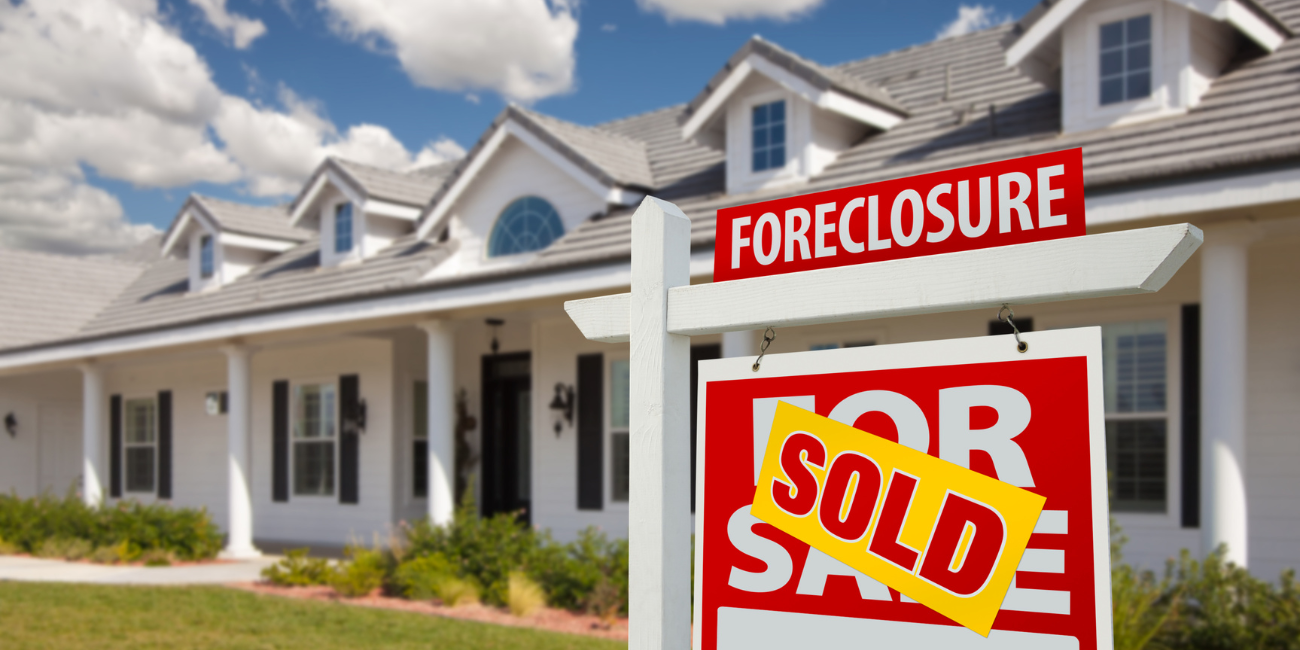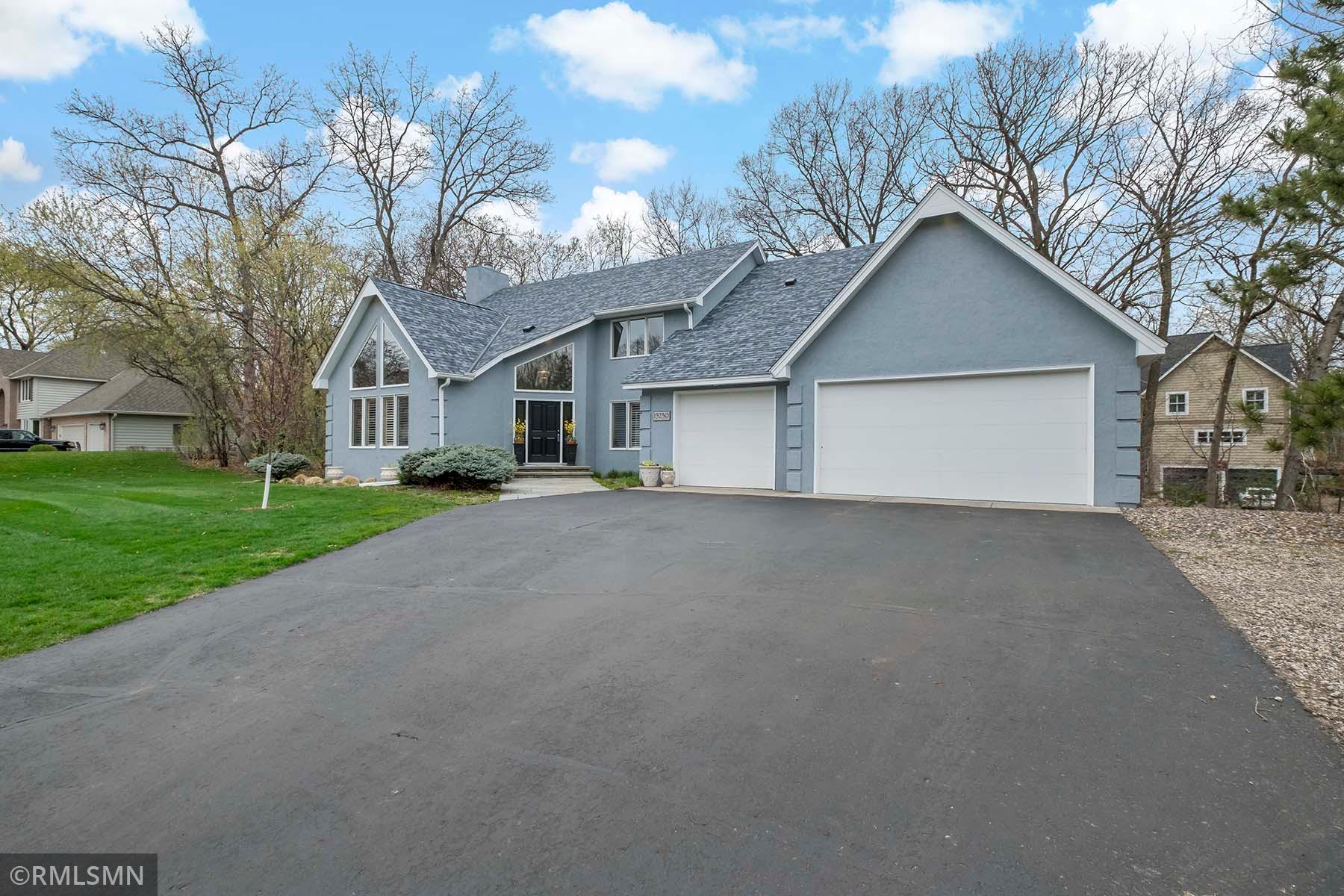Are you looking to dive into real estate investments? Understanding how to buy real estate foreclosures is a great place to start. Foreclosed properties offer a unique opportunity for buyers, with potential benefits that include lower prices and investment opportunities.
So, today's article will provide an overview of what it takes to purchase foreclosure properties successfully. We aim to ensure you receive insight into current market values, understand the process and steps involved in buying foreclosures, and research local inventory and market conditions!
Let's explore the ins and outs of buying real estate foreclosures together.
What Is Foreclosure in Real Estate?
In real estate, foreclosure occurs when borrowers fail to pay their mortgage fees, which leads to the lender taking control of the property. A lender can reclaim homes if borrowers default on their mortgage payments because every mortgage contract includes a lien on the property.

How Does Foreclosure Work?
Foreclosure is a multi-stage process that potential buyers should understand when purchasing a foreclosed home. It begins with payment default when the homeowner misses at least one mortgage payment. If several months of expenses are omitted, the entire mortgage can default, leading to the preforeclosure stage. After 90 days of missed payments, lenders typically send a notice of default.
At the next step, the trustee's sale involves lenders selling properties through public auctions. If no buyers arise during the trustee's sale phase, the bank becomes the property owner and tries to sell it, known as the REO stage.
An REO stage offers greater control over negotiation and financing options for individuals interested in buying foreclosed homes, especially those utilizing VA loans.
Types of Foreclosure Sale
The process of finding a foreclosed home varies depending on the stage of foreclosure. The homeowner may still own properties in the early stages or be offered as short sales, while banks or government entities could hold others. Let's explore five different types of foreclosure and the corresponding purchasing approaches.
Preforeclosures
In a preforeclosure, the lender informs the borrower about default on payments before the property goes up for auction. During preforeclosure stage, homeowners can avoid a full foreclosure, which can adversely affect their credit score. Many of these properties are listed in county courthouses or city buildings, and online resources like Foreclosure.com make it easy to find them.
Short Sales
In a short sale, homeowners who cannot pay off their mortgages can sell the property for less than the outstanding mortgage balance. Such a sale is typically done with their lender's agreement, even before they default on payments. Short sales often occur when homes are considered underwater, meaning their value is less than what's owed on the mortgage.
To qualify for a short sale, lenders must agree to accept an amount that falls short of what is owed by selling the property below its market value. These properties will be listed as "short sales pending bank approval."
There are a few differences between short-sale properties and other homes; they have additional contract language that indicates that the lender must approve terms and conditions. Due to long decision-making processes, banks may take several months to respond to offers on these properties.
Many real estate websites offer search options tailored explicitly for finding short-sale properties available for purchase. Several listing services and individual firms provide buyers like yourself with tools that let them quickly access and view available opportunities within relevant time frames during searches.
Sheriff's Sale Auctions
Lenders use sheriff's sale auctions to recoup the outstanding loan amount when borrowers fail to make mortgage payments after being notified that they are in default.
Usually held at the steps of city courthouses, sheriff's sales are overseen by local law enforcement authorities. The property is sold to the highest bidder during these publicly announced events.
Individuals can refer to local newspapers or search online for information about sheriff's sale auctions using terms such as "sheriff sale auctions." The resulting search results will provide information about upcoming auction dates, locations, and times.
Bank-Owned Properties
If properties fail to sell at auction, they become bank-owned or real estate-owned (REO) properties. Banks typically manage these properties through their REO departments. Online platforms like RealtyTrac offer comprehensive listings of bank-owned properties searchable by location, city, state, or ZIP code.
Government-Owned Properties
Homeowners reclaiming and selling homes insured by the Federal Housing Administration (FHA) or Department of Veterans Affairs (VA) are represented by brokers representing those agencies. To purchase government-owned properties, buyers must consult an authorized broker.
Research the Different Methods for Buying a Foreclosure
Buying a foreclosure requires thorough research. Foreclosed properties can be purchased in various ways, and your specific requirements will determine which method is best for you. Let's consider the most common paths when buying a foreclosed property.
Purchasing a Foreclosed Home from the Owner
When homeowners know the potential for foreclosure, they may opt for a preforeclosure or short sale to sell their property before it enters full foreclosure. Short sales differ from actual foreclosure sales as the owners still maintain ownership.
However, navigating short sales can be challenging. In these situations, homeowners seek permission from their loan provider to sell the property for less than what is owed on their mortgage.
But some banks accept the loss. Since banks prefer to carry delinquent mortgages on their books rather than risk default, sellers offer low prices to sell fast before becoming further behind. However, buying at this stage is problematic since even if sellers accept offers, the bank or lender must approve, which can result in rejection if the price is too low.
Buying a Foreclosure Property at an Auction
A real estate auction is a traditional method of buying foreclosed homes. Banks and lenders sell properties that have defaulted on mortgage loans during such auctions. The benefits of auctions include being able to purchase houses quickly and at a lower price.
However, risks are associated with participating in an auction, including:
- Homes purchased at public auctions may have liens from government agencies if previous owners failed to pay property taxes.
- The property acquired might require costly repairs.
- Appraisals that determine market value and prevent overpaying may not be possible during an auction.
These factors highlight the importance of thorough research and due diligence before participating in foreclosure auctions.
Buying a Foreclosed House from the Bank
Another option for buying a foreclosed house is through direct purchase from the bank or lender on the open market. These properties are often called "REO" (real estate owned) and indicate that the bank or lender has acquired them after foreclosure proceedings.
Once a property becomes REO, any liens are typically cleared, and previous homeowners may be evicted before it is listed for sale. The bank aims to recover what is owed on the property after acquiring it at auction.
To facilitate sales of these homes, banks commonly enlist local real estate agents who will handle listing and marketing processes. Such enlisting allows potential buyers like yourself to engage directly with banks when purchasing foreclosed properties.
Buying a Government-Owned Property
Another option to consider when purchasing a foreclosure property is buying one government-owned. Government agencies such as HUD, Fannie Mae, and Freddie Mac acquire these properties when homeowners default on federally insured mortgage loans.
For example, if an owner stops paying for a home financed with an FHA loan, HUD takes possession of the foreclosed property. These homes are then listed for sale by the government agency, allowing interested buyers to make offers.
Commonly, government-owned foreclosures are sold "as is," which means they are subject to buyer responsibility for any repairs. The government may have made structural repairs before selling or upon request from potential buyers. Before viewing or inspecting a home thoroughly, you may have to submit an offer or bid.
Determine How Much Home You Can Afford
You should be prepared to budget when buying a foreclosed home. While many properties are available at a lower price, realizing they are not free is essential, and unrealistic expectations of purchasing for a dollar are unfounded. To navigate the foreclosure market successfully, knowing what you can afford is critical based on your financial situation.
Create a House Budget
Creating a house budget is essential before purchasing a foreclosed home. It involves listing your monthly income and expenses, including estimates for discretionary spending like dining out and entertainment, to determine an affordable mortgage payment.
Failing to establish a budget can lead to buying a home beyond your means, even in the case of foreclosure purchases. Overextending yourself financially would result in struggling with monthly mortgage payments.
First-time buyers need extra caution when considering foreclosed properties since they might be enticed by low price tags near their maximum budgets. However, these homes often require costly repairs, which may strain finances further if limited by high mortgage payments.
Calculate Your Debt-to-Income Ratio
Before purchasing a home, including foreclosed properties, it's crucial to calculate your debt-to-income (DTI) ratio. DTI analysis determines the proportion of your gross monthly income allocated towards expenses, including the estimated new mortgage payment.
Lenders typically prefer a DTI ratio of no more than 43%. If it exceeds this threshold, qualifying for a home loan becomes challenging. By understanding and managing your DTI ratio effectively, you can ensure financial stability when considering foreclosure purchases or any other type of real estate investment.
Hire an Experienced Real Estate Agent
When purchasing a foreclosure, it's crucial to hire a skilled real estate agent with access to the local multiple listing service (MLS) and extensive knowledge of the market. Such an agent can help you identify bargain-priced foreclosed homes or properties listed at inflated prices considering associated risks. They are also skilled in finding overlooked foreclosures that other buyers may miss.
Moreover, a competent real estate agent will highlight potential challenges to buying a foreclosure property since each state has distinct laws and regulations about such transactions. Working alongside an expert who comprehends these legalities is essential throughout the process for smooth navigation and accurate decision-making.
Get Preapproved for a Mortgage
Obtaining preapproval for a mortgage is advisable, regardless of the type of home you intend to buy. During the preapproval process, your credit, income, and debts will be verified by a lender at no cost. Based on the assessment, the lender will determine how much they can approve for your mortgage loan amount.
Secure a Preapproval Letter
Securing a preapproval letter from a lender is crucial as it provides an accurate home purchase budget. Knowing the exact amount helps you avoid wasting time researching homes outside of your price range.
A preapproval letter makes you an attractive buyer to sellers, especially in foreclosure situations involving banks or government agencies. Sellers prefer working with buyers who have already been vetted and can qualify for a mortgage. It eliminates concerns about loan eligibility and positions you favorably among competing offers.
When multiple buyers contest for the same property, sellers prioritize those with preapproved mortgages since credit issues are particularly sensitive during foreclosure transactions. Proving that securing financing won't be an obstacle raises the odds of your offer being accepted by motivated sellers seeking reassurance regarding financial stability and capability.
Compare Interest Rates
When securing a mortgage, it's wise to compare interest rates and loan fees from multiple lenders rather than settling for the first option. Finding a lender with the lowest interest rate can save you substantial money over the term of your mortgage.
If you already have preapproval from one lender but decide to purchase a bank-owned property, note that a specific bank or lender may request their preapproval. However, remember that you are not obligated to stick with them. You can still use your original company's preapproval while considering other options for financing the bank-owned home to get flexibility in choosing the best terms and conditions for your financial needs during foreclosure purchases.
Apply for Final Approval
Your next step will be to apply for full mortgage approval after you have found your desired home and the seller accepts your offer. Since they have already assessed your income and creditworthiness, the process may be more straightforward if you already have preapproval. Before final approval can be granted, additional documentation may be required, such as recent pay stubs, tax returns, and W-2 forms.
The purpose of applying for full mortgage approval is for the lender to confirm that there have been no significant financial changes since you obtained preapproval - ensuring a thorough evaluation of your existing financial standing before proceeding with the purchase process.
Make a Competitive Purchase Offer
If the property is in preforeclosure, your real estate broker will submit the offer to the current homeowner.
Bidding on a Home at Auction
When considering a foreclosed home that will be auctioned, contacting the trustee or attorney organizing the auction for any inquiries about the property is essential. Trustees act as third-party representatives who oversee foreclosure auctions on behalf of lenders or government agencies and accept bids during these events.
Creating an Offer on a Bank or Government-Owned Property
Your real estate representative will present your offer directly to the bank's listing agent when dealing with a bank-owned (REO) property. Buyers do not have direct contact with the bank in this process.
Similarly, your agent will present the offer to the government agency handling the sale of government-owned properties.
While foreclosed homes generally sell at discounted prices, making a shallow offer may lead to rejection by sellers - whether they are federal entities, banks, or lenders involved. Working closely with your real estate representative is crucial as they can guide you in making a competitive and reasonable offer based on market value.
Furthermore, if you are purchasing at an auction, where such contingencies might not apply, it is essential to include a contingency for a home assessment in your purchase offer. In such a case, only a thorough inspection and due diligence process on the property will allow the sale to be finalized.
Get a Home Inspection If Possible
It's crucial to remember that when purchasing a foreclosed home, it is sold as-is. The responsibility for any necessary repairs falls on the buyer, not the seller (whether a bank, lender, or government agency).
Thus, conducting a thorough inspection of the property during the offer process becomes vital. If significant issues are uncovered, or repair costs exceed your budgetary limits, consider opting out of buying the home after careful consideration based on these findings.
Inspecting a Bank or Government-Owned Home
After your offer is received but before the sale closes, banks and government agencies usually allow a home inspection contingency, meaning you can schedule a home assessment after your offer has been accepted. During the examination, an experienced home inspector will look for leaks in the roof and foundation.
Upon inspection completion, you'll receive a written report detailing all findings. If significant problems are discovered, you can choose to walk away from the purchase. However, remember that foreclosed homes often leave little room for negotiation regardless of inspection outcomes.
Be prepared to allocate additional funds toward repairs, as foreclosed homes commonly require maintenance work. To gain insight into its current condition, find out how long it has been unoccupied and if previous owners performed routine upkeep.
Ensure thorough due diligence before buying bank-owned or government-owned properties.
Inspecting an Auctioned Property
Purchasing a foreclosed home at auction presents unique challenges, as you won't have the chance to schedule a home inspection or even enter the property. Such lack of assessment makes it inherently risky since hidden problems may only surface after you've become the homeowner, despite potentially lower prices associated with auctions.
Benefits of Buying a Foreclosed Home
Buying a foreclosed home offers several advantages:
1. Lower prices: Foreclosed homes are typically priced below market value or at a discount compared to other properties in the area. Lenders aim to sell these homes quickly and recover their investment.
2. Loan options: While the buying process may differ, you still have loan options for purchasing foreclosures that aren't cash-only auctions. If the property is livable, you can apply for conventional or government-backed VA, FHA, or USDA loans to finance your purchase. Government-backed loans often make homeownership more affordable. However, the government may require necessary repairs if there's damage to the property.
Drawbacks of Buying a Foreclosed Home
Buying a foreclosed home comes with certain drawbacks and risks that should be considered:
1. As-is sales: Lenders prioritize recouping their investment quickly, resulting in most foreclosures sold "as is." This means the seller might make no negotiations or repairs before closing. It's crucial to have sufficient cash reserves available for potential post-purchase renovations and repairs.
2. Squatter's rights: Even if a home has been legally foreclosed on, it doesn't guarantee it will be vacant at purchase. Unoccupied properties can attract settlers who may claim occupancy rights despite having no legal claim to the home, as legitimate occupants don't automatically forfeit their rights during foreclosure. Such a situation requires legal eviction processes, which can take months and involve significant attorney fees.
Who Should Buy a Foreclosed Home?
Foreclosed homes can be viable for individuals who invest time in thorough research to navigate delays and complex paperwork. Having the ability to provide significant cash reserves for repairs, overdue taxes, and liens is advantageous.
Being eligible for federal financing programs like 203(k) loans or HomePath ReadyBuyer and HomeSteps mortgages offers additional benefits. These programs were designed specifically to assist homebuyers.
Without these options, making an all-cash offer may give you a competitive edge when purchasing foreclosed properties.
Who Should Not Buy a Foreclosed Home?
Foreclosed homes may not be suitable for specific individuals, including those who need a home quickly or lack the emotional resilience to handle potential disappointments and frustrations. It's also advisable to avoid such buy if you're shopping at the maximum limit of your budget since unforeseen costs might arise that require extra cash reserves beyond your initial purchase.
Conclusion
In conclusion, buying real estate foreclosures can be a rewarding investment strategy when done correctly. Critical steps are to conduct thorough research about the foreclosure process, understand local market conditions, and work with a real estate agent specializing in foreclosures. Making informed decisions requires professional advice throughout your journey.
At Excelsior Realty, we have years of experience in navigating the foreclosure market and assisting clients in their property investments. Contact us today to receive expert guidance tailored to your specific needs. Please take advantage of our knowledge, expertise, and commitment to helping you make successful foreclosure purchases.


